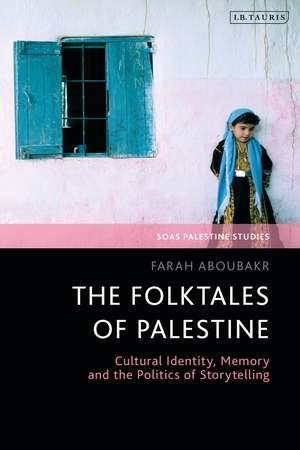The Folktales of Palestine: Cultural Identity, Memory and the Politics of Storytelling: SOAS Palestine Studies
Autor Farah Aboubakren Limba Engleză Paperback – 22 feb 2023
| Toate formatele și edițiile | Preț | Express |
|---|---|---|
| Paperback (1) | 191.85 lei 6-8 săpt. | |
| Bloomsbury Publishing – 22 feb 2023 | 191.85 lei 6-8 săpt. | |
| Hardback (1) | 657.29 lei 6-8 săpt. | |
| Bloomsbury Publishing – 20 mar 2019 | 657.29 lei 6-8 săpt. |
Din seria SOAS Palestine Studies
- 31%
 Preț: 772.58 lei
Preț: 772.58 lei - 23%
 Preț: 192.19 lei
Preț: 192.19 lei - 23%
 Preț: 192.82 lei
Preț: 192.82 lei - 30%
 Preț: 511.40 lei
Preț: 511.40 lei - 30%
 Preț: 775.43 lei
Preț: 775.43 lei - 19%
 Preț: 198.68 lei
Preț: 198.68 lei - 21%
 Preț: 217.09 lei
Preț: 217.09 lei - 21%
 Preț: 217.62 lei
Preț: 217.62 lei - 23%
 Preț: 192.19 lei
Preț: 192.19 lei - 22%
 Preț: 225.67 lei
Preț: 225.67 lei - 13%
 Preț: 174.95 lei
Preț: 174.95 lei - 24%
 Preț: 190.16 lei
Preț: 190.16 lei - 23%
 Preț: 190.96 lei
Preț: 190.96 lei - 30%
 Preț: 599.57 lei
Preț: 599.57 lei - 30%
 Preț: 509.86 lei
Preț: 509.86 lei
Preț: 191.85 lei
Preț vechi: 249.64 lei
-23% Nou
Puncte Express: 288
Preț estimativ în valută:
36.72€ • 39.90$ • 30.87£
36.72€ • 39.90$ • 30.87£
Carte tipărită la comandă
Livrare economică 21 aprilie-05 mai
Preluare comenzi: 021 569.72.76
Specificații
ISBN-13: 9780755650996
ISBN-10: 0755650999
Pagini: 256
Dimensiuni: 156 x 234 x 17 mm
Greutate: 0.36 kg
Editura: Bloomsbury Publishing
Colecția I.B.Tauris
Seria SOAS Palestine Studies
Locul publicării:London, United Kingdom
ISBN-10: 0755650999
Pagini: 256
Dimensiuni: 156 x 234 x 17 mm
Greutate: 0.36 kg
Editura: Bloomsbury Publishing
Colecția I.B.Tauris
Seria SOAS Palestine Studies
Locul publicării:London, United Kingdom
Caracteristici
Will appeal to scholars of Middle East Studies, Palestinian popular culture, Gender Studies, Memory Studies and those researching folklore and oral literature.
Notă biografică
Farah Aboubakr is a teaching fellow and researcher at the University of Edinburgh. She specialises in memory studies and Palestinian popular culture and has published in the peer-reviewed journal Marvels & Tales. She completed her PhD at the University of Manchester.
Cuprins
Note on TransliterationIntroductionChapter 1. Collective Memory in Palestine: Introductory NotePalestinian Oral HistoryThe 1948 Nakba, Trauma and NostalgiaStorytelling and LanguageChapter 2. Palestinian Folktales: Speak, Bird, Speak Again (1989) and Qul Ya Tayer (2001)Folktales: Reality versus ImaginationPalestinian Folk NarrativesThe Society of Storytellers in PalestineThe Functions of Folktales in Palestinian SocietyThe Psychological FunctionThe Social FunctionThe Belief FunctionParatextual Material in Speak, Bird, Speak Again and Qul ya Tayer ??? ?? ???Pre-Introduction Paratextual Materials (Materials Before the Introduction)Paratextual Materials within the TalesThe Tales and Post-Tales Paratextual Materials (Materials Appearing at the End of the Collections)The TalesChapter 3. Palestinian Women and the Preservation of Memory in Palestinian FolktalesMother - Daughter NarrativeMother - Son NarrativeSiblings' NarrativeSexual AwakeningMarriageChapter 4. Cultural Identity and Sites of Memory in Palestinian FolktalesPeasantry as a Site of Memory and IdentityRecreating the HomelandPeasantry and Collective IdentityLanguage and Folk Religion in Society, Environment and Universe Groups of FolktalesFood and MemoryProspective MemorySensuous MemoryFood and Women: Agents of MemoryFinal ReflectionsBibliographyAppendix 1 - Interview with Dr Sharif KanaanaAppendix 2 - Table of FootnotesAppendix 3 - Summaries of Tales in Chapter ThreeAppendix 4 - "The Old Woman and Her Cat" Al-? juz w al-bis and "Dunglet" Ba ? irunAppendix 5 - Summaries of Tales in Chapter Four
Recenzii
There is much to glean from Aboubakr's detailed and carefully-referenced work. Besides filling an important gap in academic work on Palestinian culture and heritage, the book enables the reader to comprehend the interwoven strands of Palestinian society and memory and how, without displacing the importance of Palestinian resistance, there are complementary and equally important means through which the historical trauma of the Nakba can be communicated with resilience.
This book is a timely critical contribution towards expanding the analysis and significance of oral artistic forms of expression in the Palestinian context. In addressing the importance of different forms of orality in the Palestinian context, it re-centers Palestinian voices and aspirations and emphasises their significance in the face of attempts to erase them.
For readers and students alike, there is no better example of [folktale scholarship] than Aboubakr's work. Her book not only provides a critical gateway to the tales as they are presented in Muhawi and Kanaana's collections, but also functions as an excellent introduction to Palestinian folk heritage.
Students of folklore and of folk narratives generally will thank Aboubakr for her meticulous examination, under an academic microscope, of the role of folktales in Palestinian society, the role of women as storytellers, and the role of compilers in choosing which stories to publish.
This book is a timely critical contribution towards expanding the analysis and significance of oral artistic forms of expression in the Palestinian context. In addressing the importance of different forms of orality in the Palestinian context, it re-centers Palestinian voices and aspirations and emphasises their significance in the face of attempts to erase them.
For readers and students alike, there is no better example of [folktale scholarship] than Aboubakr's work. Her book not only provides a critical gateway to the tales as they are presented in Muhawi and Kanaana's collections, but also functions as an excellent introduction to Palestinian folk heritage.
Students of folklore and of folk narratives generally will thank Aboubakr for her meticulous examination, under an academic microscope, of the role of folktales in Palestinian society, the role of women as storytellers, and the role of compilers in choosing which stories to publish.
